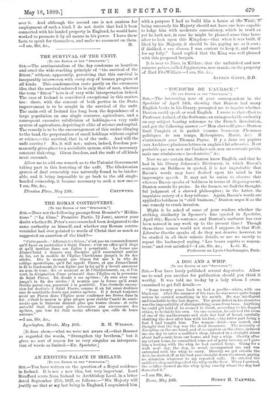" TOUJOURS DE L'AUD ACE !"
[To TILE EDITOR OF THE "SPECTATOR."] SIR,—The interesting note of your correspondent in the Spectator of April 14th, showing that Danton had many. English books in his library, prompted me to inquire whether Danton could speak or read English. I wrote to that effect to Professor Aulard, of the Sorbonne, an unimpeachable authority on any subject bearing reference to the French Revolution„ and got the following answer :—" Mon cher collegue,—Danton; lisait l'anglais et le parlait (comme beaneoup d'hounnes politiques de son temps, Robespierre, Marat, &c.) 11 s'entretenait avec Thomas Payne. Ii y a dans ses papiers (aux Archives) plusieurs lettres en anglais i lni adressees. 11 est probable quo son mot sur l'audace soit, non un souvenir précis, mais une reminiscence involontaire," &c.
Now we are certain that Danton knew English, and that he had in his library Johnson's Dictionary, in which Bacon's sentence on Boldness in quoted, it is not improbable that Bacon's words may have flashed upon his mind in his impromptu speech. It may not be amiss to observe that whereas Bacon speaks of boldness in terms of disparagement, Danton sounds its praise. In the former, we find the thought- ful judgment of a shrewd philosopher ; in the latter, the impulsive outcry of a fiery tribune. Again, Bacon's words are applied to boldness in "civil business ;" Danton urges it as the one remedy to crush invasion.
Might it be asked of some of your readers whether the
striking similarity in Spenser's line (quoted in Spectator, April 6th), Bacon's sentence, and Danton's outburst has ever been noticed in any work up to the present time ? Though these three names would not stand, I suppose, in that Welt- Literatur Goethe speaks of, do they not deserve, however, to be studied in all their minute details, or are we merely to repeat the hackneyed saying, "Les beaux esprits se rencon-
trent," and rest satisfied P—I a.ih, Sir, &c., L.-G. R., Professeur au Lyeee Charlemagne, Paris.


































 Previous page
Previous page